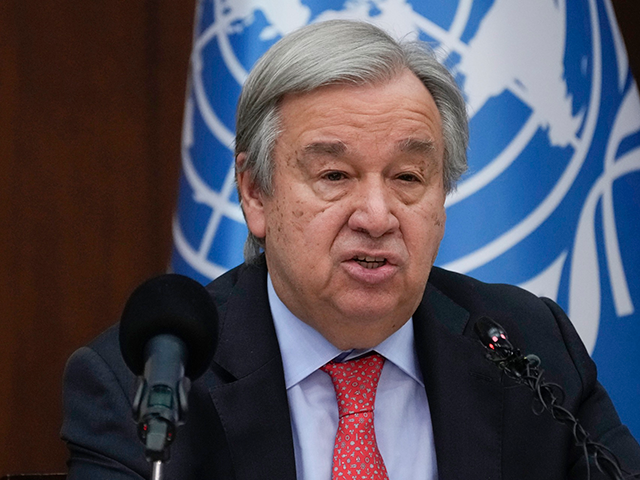One of the allegedly classified files exposed by alleged “Pentagon leaker” Jack Douglas Teixeira implies that U.S. intelligence agents have been monitoring U.N. Secretary-General Antonio Guterres.
Several of the documents describe private conversations between Guterres and his deputy, Amina Mohammed.
One of these conversations ostensibly revealed Guterres was so determined to preserve a deal with Russia that allowed Ukrainian grain exports to flow through the Black Sea that he considered helping “sanctioned Russian entities or individuals” defy U.S. and European export bans.
Guterres purportedly felt the grain deal was so important to averting a global food crisis that he told Russian Foreign Minister Sergei Lavrov he would help Russian exports bypass sanctions.
This conversation was accompanied by a U.S. intelligence estimate that Guterres was “undermining broader efforts to hold Moscow accountable for its actions in Ukraine.”
Another document portrayed Guterres as “dismayed” by calls for Europe to produce more weapons and ammunition to supply Ukraine. A third quotes Mohammed telling Guterres that she did not trust the “ruthless” president of Kenya, William Ruto.
A fourth transcript found Guterres telling the executive director of his office, Miguel Graca, that he was annoyed with Ukrainian President Volodymyr Zelensky for asking him to make more trips to Kyiv after he has already made the journey several times over the past year.
Korir Sing’oei, a senior Kenyan foreign affairs official, said on Friday the remarks about Ruto were “disturbing,” but insisted Ruto would not alter his cooperation with the U.N. on issues such as climate change and regional security.
“The president will therefore not be distracted by the information contained in tainted leaked memorandums,” he said.
Sing’oie added that the Kenyan government “abhors the surveillance of the leadership of the United Nations” exposed by the alleged leaks.
Kenyan ambassador to the U.N. Martin Kimani said he spoke with Guterres and Mohammed to “seek clarity” on their position and restate Kenya’s denunciation of the United States for keeping Guterres under surveillance.
U.N. spokesman Stephane Dujarric challenged the accuracy of the leaked documents, calling them a “horrendous distortion” and insisting Mohammed’s comments on Ruto were “taken out of context.”
Dujarric said Mohammed has “the highest regard for President Ruto and his leadership.”
Dujarric said Guterres is not unduly troubled by the leaked documents but also lashed out hard at the U.S. government for both allegedly spying on Guterres and allowing the transcripts to be exposed.
“The secretary-general has been at this job, and in the public eye, for a long time. He’s not surprised by the fact that people are spying on him and listening in to his private conversations,” Dujarric said.
“What is surprising is the malfeasance or incompetence that allows such private conversations to be distorted and become public,” he added.
Dujarric said the U.N. would “take whatever measures we can” to defeat surveillance efforts, but also urged all member states to “respect the viability of U.N. communications.”
Ukraine’s U.N. ambassador, Sergiy Kyslytsya, told CBS News on Thursday that his government does not perceive Guterres as soft on Moscow.
“Secretary-General Guterres made his position on the full-scale aggression of Russia against Ukraine very clear on the night of the invasion, a position now guided by several U.N. General Assembly resolutions supported by the overwhelming majority of the member states,” Kyslytsya said.
“The secretary-general has never misled me. He is very attentive to the issues I bring to his attention. He follows [up] on my requests even when he travels. I think that Antonio Guterres is a world-class statesman with many decades of experience of dealing with many dramatic challenges,” Kyslytsya added.
As luck would have it, the Black Sea grain deal Guterres allegedly discussed in one of the leaked documents is due to expire on May 18. Russia said on Wednesday that the prospects of extending it were “not so great” because Russian exports are still seriously hindered by sanctions.
“No deal can stand on one leg. It must stand on two legs,” said Kremlin spokesman Dmitry Peskov.
Peskov said a side deal struck by the U.N. in July to help Russia with food and fertilizer exports “has not worked and is not working so far.” Moscow said it would only renew this deal again if certain demands were met, including allowing Russia to once again access the global SWIFT payment system, and restraining a pipeline that brings Russian ammonia to a Black Sea port.
“The secretary general has no authority over Swift. He has no authority over member states that impose unilateral sanctions. He has no authority over insurance companies, shipping companies, he can’t tell them what to do,” Dujarric said on Wednesday in response to these demands.

COMMENTS
Please let us know if you're having issues with commenting.